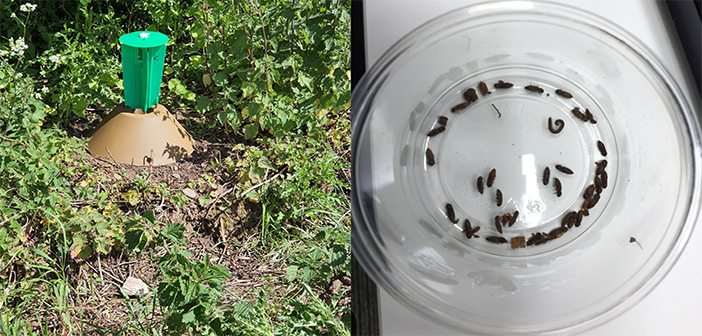A new, highly effective lure has been developed by International Pheromone Systems that can help farmers to monitor all three types of Agriotes beetles.
Agriotes beetles are one of the most economically damaging pests of arable and horticultural crops. Their slow-growing larvae (wire worms) feed on the roots of a variety of root and leafy crops including sugar beet, potatoes, oats and barley making them unfit for human consumption.
Plant damage includes boring and feeding of roots and injury to stem bases, patchy seedling emergence and wilting of seedlings.
Three most common pest species are Agriotes lineatus (lined click beetle), Agriotes obscurus (dusky wireworm) and Agriotes sputator (common click beetle). Globally, the lined click beetle is the most common pest and is found throughout Europe, Northern Asia, North America and New Zealand.
Scientists at IPS decided that an effective lure that attracts all three commonly encountered species would be advantageous to growers so that control strategies can be rapidly implemented if trapped numbers of either species are high in monitoring traps.
Previous traps available for monitoring were expensive and overly complex to put together and install. IPS has recently developed a new pitfall type trap for weevil pests and this design was thought to be suitable for monitoring of Agriotesbeetles.
Development work was undertaken over the Spring of 2022 to assess the new trap design and three lure types: a standard single species lure; a multi-species lure using the standard polyvial dispenser format and a multi-species lure using a new dispenser design.
Technical manager for IPS Dr Sam Jones said: “This is really good news for farmers and growers who have to battle with this very common and damaging pest species. Often when pheromone formulations are developed to attract multiple species we see a loss in efficacy when compared to a single species variant.
“However, this was not the case for Agriotes lineatus in this trial which showed that the IPS multi-species lure variant can be used with confidence. The IPS trap was found to perform as well other traps in the field and offers a more robust option for growers. Attraction maybe further improved by using a second lure within the bucket and this will be researched in 2023.”


